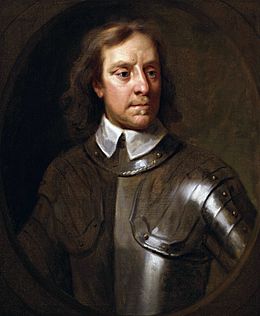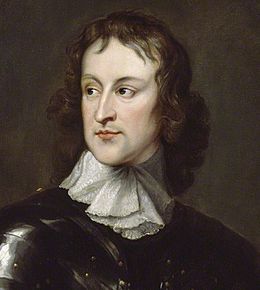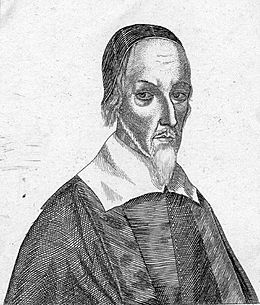Barebone's Parliament facts for kids
The Barebone's Parliament was a special group of leaders who tried to govern England in 1653. It was also known as the Little Parliament or the Nominated Assembly. This assembly was the last big effort by the English Commonwealth to find a stable way to rule the country before Oliver Cromwell became the Lord Protector.
Oliver Cromwell and the Army's Council of Officers chose all the members of this parliament. It got its most famous name, Barebone's Parliament, from one of its members, Praise-God Barebone, who was chosen from London. The leader of the assembly was Francis Rous. There were 140 members in total: 129 from England, five from Scotland, and six from Ireland.
After many disagreements, the members of the assembly voted to close it down on December 12, 1653. Before Barebone's Parliament, the Rump Parliament was in charge. After it, the First Protectorate Parliament took over.
Contents
Why a New Parliament Was Needed
After King Charles I was executed, the Rump Parliament was the only part of the English government left. However, many people felt it didn't truly represent them. It only held elections to replace members who had left. People across the country wanted important changes, but the Rump Parliament was very slow to act.
For example, they passed a Navigation Act to help English merchants. But this law also led to the First Anglo-Dutch War in 1652. Everyone expected a new parliament to be called soon, but the Rump Parliament showed no signs of giving up its power.
Choosing a New Government
When the Rump Parliament was forced to close on April 20, 1653, there was no clear plan for what should come next. Oliver Cromwell and his Council of Officers felt they had to step in. They believed they were guided by "necessity and Providence" (meaning God's plan) to act.
On April 29, Cromwell set up a small Council of State. This group of thirteen members handled foreign policy and managed the country. But the Council of Officers still had to decide on the new form of government.
John Lambert, one of the officers, thought power should be held by a small group of ten or twelve men. However, Thomas Harrison had different ideas. He was a Fifth Monarchist, someone who believed that Christ's kingdom on Earth was coming soon. Harrison argued that their job was to help bring about this kingdom by putting "godly men" in power. He suggested a larger assembly, perhaps 70 members, like the ancient Jewish Sanhedrin.
The Council of Officers agreed with Harrison's idea. They decided to have 140 representatives. This number allowed members from England, Wales, Scotland, and Ireland. The Scottish and Irish delegates were actually English soldiers serving in those countries.
Next, they had to figure out how to choose these representatives. The Council of Officers decided that they would choose the members themselves. Each officer could suggest names. Cromwell, as the army's commander-in-chief, would officially give power to each chosen member.
Most religious groups welcomed this decision. However, some churches were not happy. One person in London said, "the question is not so much now who is Independent, Anabaptist, etc., as who is for Christ and who is for Cromwell." This meant they worried about Cromwell's power.
Historian S. R. Gardiner thought the Council of Officers might have asked churches in each county to suggest suitable candidates. But there is no proof of this. While some churches did send nominations, it doesn't seem like a widespread consultation happened. By early May, the Council of Officers had over a hundred names. By late May, they had a first list, which they then improved over the next few weeks.
Starting the Assembly
The assembly first met on July 4, 1653, at Whitehall. Cromwell gave a long speech, about two hours. He talked about all the events that led them to this point, starting with the Short Parliament. He called 1648 "the most memorable year that ever this nation saw."
In his speech, Cromwell said, "God doth manifest it to be a day of the Power of Jesus Christ." Some people thought this meant Cromwell shared Harrison's strong religious beliefs. They believed he saw the assembly as the start of Christ's kingdom on Earth. However, the first printed version of the speech used "a day" instead of "the day." This makes it sound like he just thought it was a very joyful and spiritual occasion.
Cromwell then had a written document read aloud. This document, created by the Council of Officers, officially gave power to the new assembly.
The assembly then took a break before meeting fully the next day. On July 5, they elected Francis Rous as their chairman. He wasn't called "Speaker" until a month later. Henry Scobell was chosen as the Clerk. Cromwell and four other officers – Lambert, John Desborough, Harrison, and Matthew Tomlinson – also joined as members. On July 12, the assembly announced that it was the official parliament of the Commonwealth of England. This was the first time it was formally called a parliament.
Who Were the Members?
Barebone's Parliament quickly became a target for jokes and insults. One writer called its members "Pettifoggers, Innkeepers, Millwrights, Stockingmongers and such a rabble as never had hopes to be of a Grand Jury." People made fun of them for supposedly having low social status, being too religious (Puritan), and not having much political experience.
These criticisms often focused on Praise-God Barebone himself. He was a leather seller, a Fifth Monarchist, and a lay preacher from London. Before it ended, the assembly became widely known as Barebone's Parliament because of him.
Despite these insults, most members of the assembly actually came from the richest five percent of the population. Very few were tradesmen. Also, it wasn't just made up of Fifth Monarchists, even though hostile writers tried to make it seem that way. Only about twelve or thirteen members were clearly Fifth Monarchists. Many of these had served with Harrison in the army.
In contrast, about fifteen of the more active members were moderate Independents. While it's not quite right to say the assembly had two clear "parties," we can divide its members into groups. About 76 members were religious moderates, and 47 were radicals. Another 21 members were either hard to identify or didn't take part much.
Only four of the men who had signed the death warrant for King Charles I (called regicides) were appointed to this parliament. These were Anthony Stapley, John Carew, Thomas Harrison, and Cromwell himself. Thomas Harrison and John Carew were both Fifth Monarchists.
Growing Problems and Disagreements
On July 13, the assembly started debating tithes. Tithes were payments, usually one-tenth of a person's income or produce, given to support the church. Many religious groups disliked tithes. They saw them as a leftover from Catholicism. They also felt tithes supported paid clergy instead of voluntary religious leaders. And they believed tithes were an unfair financial burden. Everyone agreed that tithes were a problem, but they couldn't agree on how to replace this way of funding the church.
Debates within the assembly quickly led to petitions from churches all over the country. Another big issue the assembly discussed was the trial of John Lilburne. This topic also caused a lot of disagreement. A third issue was reforming the legal system. This again divided the members. Fifth Monarchists argued that only laws found in the Bible should be used in the country's legal system. Meanwhile, former members of the Rump Parliament's Hale Commission wanted more gradual changes to the law.
By early September, Cromwell was already getting frustrated with the constant arguments among the different groups in the assembly. A writer reported that Cromwell told a friend he was "more troubled now with the fool than before now with the knave." He also wrote to his son-in-law Charles Fleetwood, complaining that the members "being of different judgements, and of each sort most seeking to propagate their own, that spirit of kindness that is to them, is hardly accepted of any."
Attendance at meetings also started to drop. In July, over one hundred members usually voted. By October, the average turnout was only about 70. Several proposed laws made the conflict worse between the radical and moderate members. Bills to get rid of the Court of Chancery (a high court), control legal fees, and speed up cases in the Court of Admiralty (for sea-related cases) all got stuck in arguments. At this point, however, the radical members were still usually outvoted by the moderate and conservative members.
The End of the Parliament
The situation changed in November and December when the debate about tithes came up again. On December 6, the committee that had been looking into tithes presented its report. The report suggested how to remove unfit ministers and named people who would do this. It also said that tithes should still be supported in certain situations. The first part of this report was voted against by 56 votes to 54. This was a defeat for the moderates.
Two days later, moderate members came to the House. They demanded that the assembly give up its powers. They criticized the radical members for causing so much disagreement, which they felt was threatening the well-being of the Commonwealth. Francis Rous and about 40 members walked out. They went to Cromwell at Whitehall and presented a document signed by nearly 80 members. It said: "Upon a Motion this day made in the House, that the sitting of this Parliament any longer as now constituted, will not be for the good of the Commonwealth." The members who were left in the assembly were soon told by soldiers to leave.
The failure of this assembly, which had been formed by radical ideas, led to the Grandees (senior army officers) passing the Instrument of Government in the Council of State. This document set the stage for Cromwell's rule as Lord Protector.
See also
 | Laphonza Butler |
 | Daisy Bates |
 | Elizabeth Piper Ensley |




